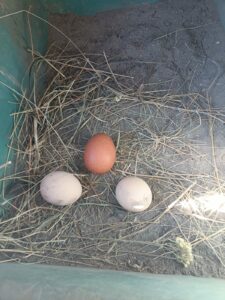The Effect of Classical Music on Egg Production: A Personal Experiment with Chickens
At Vegetarium, one of our daily responsibilities is taking care of three chickens. This includes providing food, changing their water, cleaning the cage, and giving them around 30 minutes of free-ranging twice a day. Recently, I took charge of their care for the week and decided to conduct a small experiment using a technique passed down by my grandfather—playing classical music for the chickens.
The idea behind this experiment was simple: could music improve the chickens’ mood and, as a result, their egg production? It’s believed that animals, much like humans, can respond to music, and I was curious to see if classical music could positively influence our chickens.
For the experiment, I chose three renowned composers: Tchaikovsky, Mozart, and Bach. Interestingly, the chickens seemed to respond differently to each composition. In particular, Swan Lake by Tchaikovsky seemed to have the most noticeable effect. During the days I played Swan Lake, I collected an impressive three eggs per day—remarkable for just three chickens.
 At first glance, this suggested that music might indeed influence egg production. However, there are other factors to consider. The amount of time the chickens spend walking around may also play a significant role in their mood and productivity. I typically allow them to roam freely for 30 minutes in both the morning and afternoon, which could have just as much, if not more, of an impact as the music itself. It’s also worth noting that the chickens are outside when the music is playing, so they may not even be hearing it for the entire time.
At first glance, this suggested that music might indeed influence egg production. However, there are other factors to consider. The amount of time the chickens spend walking around may also play a significant role in their mood and productivity. I typically allow them to roam freely for 30 minutes in both the morning and afternoon, which could have just as much, if not more, of an impact as the music itself. It’s also worth noting that the chickens are outside when the music is playing, so they may not even be hearing it for the entire time.
Another factor is nutrition. We add calcium powder to their diet to help strengthen their eggshells, and I tend to be generous with it. This nutritional boost could also be a major contributor to the increased egg production, challenging the notion that music is the primary factor.
Nonetheless, I’ve noticed subtle changes in the chickens’ behavior and productivity during the experiment. While long walks and proper nutrition are certainly crucial, I believe the association between music, food, and freedom might play an important role. Each time I open the cage and serve their food, music is playing in the background. This could create a positive connection in their minds between the music, the act of feeding, and their free time, leading to the increased productivity I’ve observed.
In conclusion, while there are multiple variables at play—such as nutrition, exercise, and environment—there is still a case to be made for the role of classical music in enhancing the wellbeing and productivity of our chickens. Further exploration could offer deeper insights into how music affects animals and whether it truly contributes to something as tangible as egg production.
Ivan Herrera Topchevod

